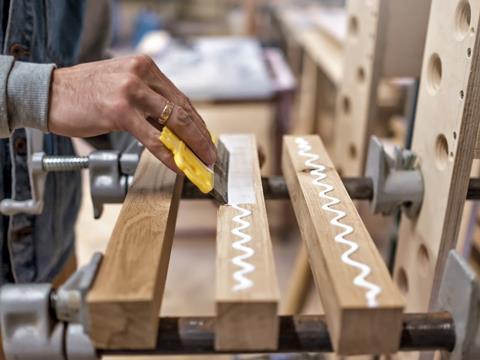
A new adhesive had been developed from industrial biowaste by BindEthics in a bid to facilitate full recyclability for 90% of engineered wood products and contribute towards a circular economy.
Formaldehyde adhesives currently used on the market are toxic, carcinogenic petrochemicals that prevent both recycling and incineration of wooden products. In the UK, for example, the particle board industry is said to consume 1000 tons of urea-formaldehyde adhesive every day at an annual value of £388 million – contributing to a £9.5 billion global market.
Apparently serving as a non-toxic, recyclable, and circular alternative, the new adhesive is derived from extracted, purified, and refined biowaste. High protein content and polysaccharides are said to contribute to its binding properties, with other natural crosslinkers and bioderived solvents also present in the formulation.
Its base formulation began development in 2021. Industrial food waste was washed, filtered, and centrifuged – a process involving the separation of molecules with differing densities using centrifugal force.
Now BindEthics is collaborating with two large, UK-based companies – an engineered wood company and a packaging company – for technical insight, and has reportedly received several Letters of Intent, including one from a European distributor.
The company’s work has been recognised through the Armourers & Brasiers Venture Prize seed funding award; commercial, scale-up and lab-based support from the Biorenewables Development Centre under their European Regional Development Programme business assist scheme and Innovate UK; and network access, business space and financial aid from the University of Birmingham and Innovate UK.
“Our glue is ethically sourced, has end-of-life biodegradability and has properties suited to replacing traditional formaldehyde adhesives,” says BindEthics co-founder and University of Birmingham student Callum Smith. “As well as being fully recyclable, the glue can be produced with almost no additional cost to the manufacturer and has a carbon footprint that is 86 percent lower than traditional adhesives.
“Our next step is to identify and conduct further commercial trials with companies which are currently using toxic and synthetic adhesives. A particular opportunity is with the corrugated board industry which is looking for alternatives to their starch-based adhesives which use borates, toxic substances imported into the UK.
“Our vision is that our new bio-adhesive derived from food waste will replace a range of adhesives used across industry. The initial focus is on replacing the formaldehyde-based glues used in the manufacture of engineered wood products, but we also envisage applications for our sustainable adhesive within the shoe and automotive industries.”
Dow’s water-borne, solvent-free lamination adhesives received RecyClass approval for mechanical recycling late last year. These were subsequently expected to enhance its REVOLOOP technology platform with an adhesive component.
Similarly, Bostik’s wash-off, all-temperature label adhesive received certification for PET bottle label recycling from the Association of Plastic Recyclers earlier this year.
Reaching the finals for the Sustainability Awards 2022, Henkel unveiled a ‘carbon negative’ hot-melt adhesive, developing another made of plastomer for re-sealing APET and polyolefin trays in collaboration with LyondellBasell.
If you liked this article, you might also enjoy:
McKinsey on whether or not on-pack sustainability claims affect consumer spending
A deep dive into the most important packaging sustainability trends and solutions
















No comments yet